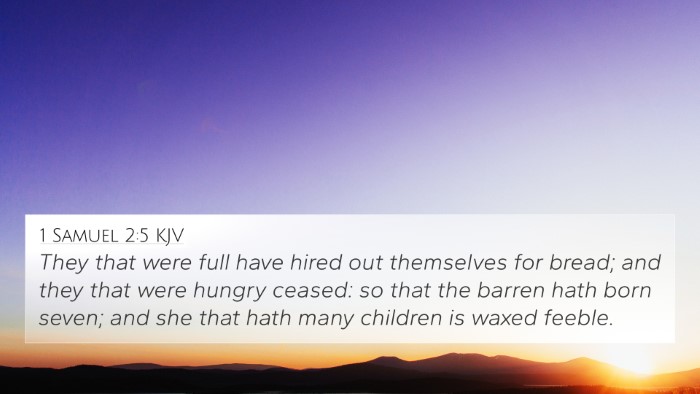Understanding Leviticus 26:18
Leviticus 26:18 states: "And if ye will not yet for all this hearken unto me, then I will punish you seven times more for your sins." This verse is a part of a larger context where God outlines the blessings for obedience and the curses for disobedience given to the Israelites.
Insights from Public Domain Commentaries
The following insights synthesize interpretations from renowned biblical scholars:
-
Matthew Henry:
Henry emphasizes the nature of God's justice in meting out punishment in relation to the severity of the sins committed. The mention of “seven times more” symbolizes a complete and perfect retribution aligning with the biblical number seven, indicating that God's judgments are thorough and not arbitrary.
-
Albert Barnes:
Barnes elaborates on the covenantal relationship between God and Israel. He points out that this verse underscores the seriousness with which God treats disobedience. The warning serves as both a command and a plea for the people to return to faithfulness, highlighting God's desire for repentance rather than punishment.
-
Adam Clarke:
Clarke explains the phrase "seven times more" as an expression that denotes intensification. He discusses how this verse illustrates God’s holiness and the necessity for His people to uphold their end of the covenant. Clarke highlights that the consequences of Israel's sin are not simply punitive but serve as a mechanism for correction and spiritual revival.
Contextual Analysis
In the broader context of Leviticus Chapter 26, the verse encapsulates a principal theme: obedience to God's commandments as a basis for receiving blessings, contrasted with the dire consequences of straying from His ways. This chapter serves as a crucial reflection on the covenantal obligations expected of God’s chosen people.
Bible Verse Cross-References
To grasp the full significance of Leviticus 26:18, we can look into various cross-referenced scriptures that help illuminate the theme of divine punishment and the seriousness of sin:
- Deuteronomy 28:15-68: This passage elaborates on the blessings and curses associated with obedience and disobedience to God's law.
- Hebrews 12:6: "For whom the Lord loveth he chasteneth, and scourgeth every son whom he receiveth," highlights God's discipline as an expression of His love.
- Galatians 6:7: "Be not deceived; God is not mocked: for whatsoever a man soweth, that shall he also reap," complements the idea of divine retribution in response to human actions.
- Numbers 14:34: Relates to the concept of punishment tailored to the nature of sin, as it describes how the Israelites' punishment corresponds to their unbelief.
- 2 Chronicles 7:14: This verse encourages humility and repentance when one has strayed, reinforcing the opportunity for restoration in the face of judgment.
- Lamentations 3:33: "For he doth not afflict willingly nor grieve the children of men" speaks to God's intent behind punishment—aiming for redemption rather than mere retribution.
- Isaiah 10:1-3: Addresses unjust laws and their consequences, again reflecting on God's justice in the face of human transgression.
- Romans 2:6: "Who will render to every man according to his deeds," connects with the moral order of rewards and penalties that govern divine justice.
- Revelation 3:19: "As many as I love, I rebuke and chasten: be zealous therefore, and repent," confirming God's pursuit of His people even in discipline.
- Micah 6:9: This verse acknowledges God’s voice in judgment and the call to heed it, connecting to the broader thematic elements in Leviticus.
Thematic Connections
Understanding this verse invites a deeper exploration into the connections between biblical themes of obedience, punishment, repentance, and restoration.
Inter-Biblical Dialogue
Leviticus 26:18 opens a dialogue with many other scriptures, which foster a deeper understanding of God's nature and His relationship with humanity:
- Repentance and Restoration: Ezekiel 18:30 emphasizes turning from sin as crucial for life and blessing.
- Dangers of Disobedience: Romans 1:18-32 discusses the consequences of disregarding God's truth.
- Divine Justice Versus Human Sin: Job 31:3 asks, "Is it not destruction to the wicked, and a strange punishment to the workers of iniquity?", paralleling the inquiry into God's judgments.
Conclusion
In summary, Leviticus 26:18 serves as a reminder of God's unwavering justice and the gravity of sin, reinforced through its strong thematic ties and cross-references within the Scriptures. This verse resonates as an urgent call for introspection and alignment with God’s commands, emphasizing His desire not just for punishment but for repentance and a faithful relationship with His people.









